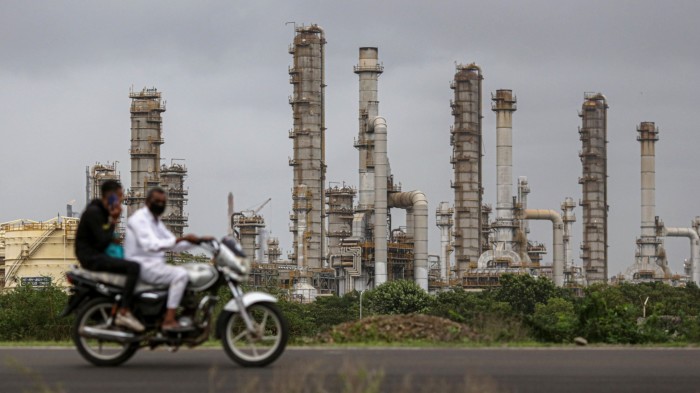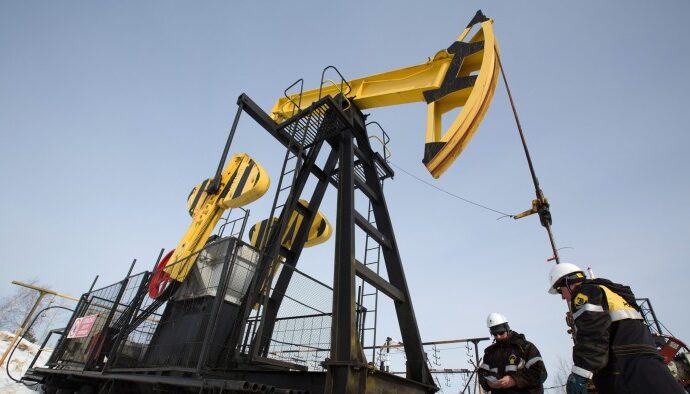
India and China’s largest refineries are looking at curbing imports of Russian oil, cutting off a key source of funds for Vladimir Putin’s war machine following Donald Trump’s sharp escalation of US sanctions.
Senior traders and officials said refineries, including the world’s largest facility in India and state-backed Chinese operators, were pausing most purchases as Trump tries to drive Putin to the negotiating table with Ukraine.
India’s Reliance Industries said on Thursday it would “recalibrate” its imports in line with government guidelines, as oil prices rose more than 5 per cent after the US measures against Russian groups Rosneft and Lukoil reverberated through global energy markets.
One person familiar with the discussions added that Reliance was unlikely to “take a chance” that could result in punishment by the US, after sanctions were announced on Wednesday night.
A person who works closely with the largest Chinese state-backed oil companies and Indian refineries said they had all paused purchases following the imposition of US sanctions, though smaller independent Chinese refiners would continue to import Russian crude.
Beijing has requested that several Chinese state oil majors suspend purchases of seaborne Russian oil following US and European sanctions, according to a Chinese trader with one of the state-owned groups. But the trader said the pause may only prove to be temporary.
China’s foreign ministry did not immediately comment.
The Trump administration’s move to step up economic measures against Moscow comes after relations between the US president and Russia’s President Vladimir Putin have deteriorated, with the cancellation of a planned summit in Budapest.
On Thursday, Putin said: “This is an attempt to put pressure on Russia. No self-respecting country ever does anything under pressure.”
“The new western sanctions will not have a significant impact on the Russian economy,” he added, arguing that replacing Russian oil on the global market would take time.
One Opec delegate said that the cartel would be ready to increase oil supplies if needed by the time of a scheduled ministerial meeting in late November — but cautioned that there was as yet “no official agreement or discussion” on the issue.
Since the full-blown war in Ukraine started in 2022, India has become the biggest buyer of seaborne Russian crude, as sanctions pushed other buyers out of the market.
Trump has previously fiercely attacked New Delhi for snapping up Russian oil, imposing steep sanctions in an attempt to dissuade it from funnelling money to Moscow.
China and India together account for about 80 per cent of all Russia’s crude exports, with oil and gas contributing about a quarter of Moscow’s federal budget.
Roughly half of China’s imports of Russian oil come by sea, with the rest by overland pipeline, which traders said may be less exposed to US sanctions.
In December, Reliance, controlled by Asia’s richest man Mukesh Ambani, strengthened its position as India’s biggest beneficiary of cheap Russian oil by signing a 10-year contract to buy almost 500,000 barrels a day of crude from Rosneft.
But the latest US sanctions mean that companies buying Russian oil risk losing access to the dollar-based financial system.
The measures unveiled on Wednesday specify that “participating foreign financial institutions” could be subject to secondary sanctions for doing business with Lukoil and Rosneft.
This means that companies such as Reliance, which has global operations, may struggle to secure financing from US banks if they continue to purchase Russian oil directly.
Helima Croft at RBC Capital Markets said that such secondary sanctions would “force refiners that rely on access to US capital markets to seek alternative sources of supply”.
Analysts expect a sharp drop starting on November 21, the deadline the US Treasury has given companies to wind down their dealings with Rosneft and Lukoil.
India imports around 1.5mn barrels a day of crude from Russia, second only to China, which imports about 2mn bpd, largely through its pipeline infrastructure.
A person familiar with the discussions between New Delhi and local refiners said the Indian government had privately asked the companies, including state-run ones, to start cutting down on Russian oil imports.
Sumit Ritolia, a Kpler analyst in New Delhi, said that for most state-run Indian refiners, such as Indian Oil, which largely source Russian crude through third-party traders, the immediate operational impact should remain limited.
“However, for Reliance, given its direct term arrangements with Rosneft, this development could introduce some near-term friction, particularly from a compliance standpoint,” he added.
Over the past three years, Reliance has been one of the biggest beneficiaries of Russian oil, earning a windfall of about $6bn due to the discounted price, according to data and analysis consultancy Energy Aspects.
India’s oil ministry and state-run company Indian Oil did not reply to a request for comment.
The Indian foreign ministry maintained that, as a “significant importer” of oil, the country needed to ensure “stable energy prices and secure supplies” but added that it would diversify energy sources “as appropriate”.
Trump has repeatedly said this month that India’s Prime Minister Narendra Modi promised him India would stop buying Russian oil, a move that could ease tension between the two nations and result in Washington lowering tariffs.
Since August, Trump administration officials have been accusing Indian companies of profiting from Moscow’s war while both countries are locked in trade talks.
Additional reporting by Anjli Raval and Leslie Hook in London
India Business Briefing
The Indian professional’s must-read on business and policy in the world’s fastest-growing big economy. Sign up for the newsletter here


